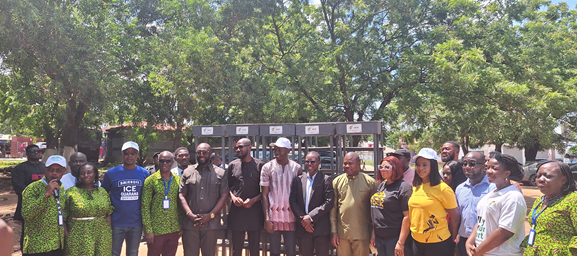By Christabel DANSO ABEAM
The Association of Ghana Industries (AGI) has called on government to provide greater transparency and accountability in the use of environmental levies collected from businesses across the country.
According to John Defor, Director of Policy and Research at AGI, although businesses continue to comply with payments under the Environmental Excise Tax (EET) and Sanitation Levy, there is little evidence of how these funds are being used to tackle the growing plastic waste and sanitation challenges facing Ghana.
“We are fulfilling our tax obligations, but we don’t see government putting those taxes to the intended use,” Mr. Defor said.
The Environmental Excise Tax, introduced in 2013, requires companies importing plastic raw materials to pay 10 percent of the CIF (Cost, Insurance, and Freight) value. Half of the revenue from this tax is meant to support plastic waste management infrastructure. In addition, the Sanitation Levy – popularly known as the ‘bola tax’ places a 10-pesewa charge on every litre of fuel purchased.
Mr. Defor noted that these levies generate significant revenue and should be channelled into waste management, environmental education and recycling infrastructure. He recommended the establishment of a dedicated fund to ensure these levies are not absorbed into the Consolidated Fund without proper use.
“With Ghana’s National Plastic Management Policy already in place, we expect stronger government commitment and visible results,” he added.
On the proposed bannig of some plastics, Mr. Defor expressed concern about its impact on businesses – highlighting that many companies already practice sustainable plastic use through recycling and second-life solutions.
Private sector efforts to fight plastic waste
Despite these concerns, private sector initiatives like the Ghana Recycling Initiative by Private Enterprises (GRIPE) under the AGI continue to play a leading role in addressing plastic waste.
As part of its ongoing efforts, GRIPE has donated 100 eco-friendly desks and chairs made from recycled plastics to five basic schools in the Ga West Municipal Assembly. Beneficiary schools include Odumase M/A Basic School 1, Medie M/A Basic School, Otsirikomfo M/A Basic School, Kwashiekuma Methodist Basic School and Afuaman M/A Basic School.
GRIPE president Eric Boamah said the donation aimed at educating and inspiring schoolchildren to embrace recycling and responsible waste management. “We’re solving two problems – educating the youth and promoting sustainability,” he said.
Victor Nene Tawiah, Ga West Director of Education, welcomed the gesture – stressing the importance of building environmental awareness among schoolchildren. He called for more support from other organisations to improve infrastructure in public schools.
Both AGI and GRIPE maintain that while private efforts are ongoing, stronger government action and clear use of environmental levies are essential to effectively combat plastic waste and promote sustainable development in Ghana.










